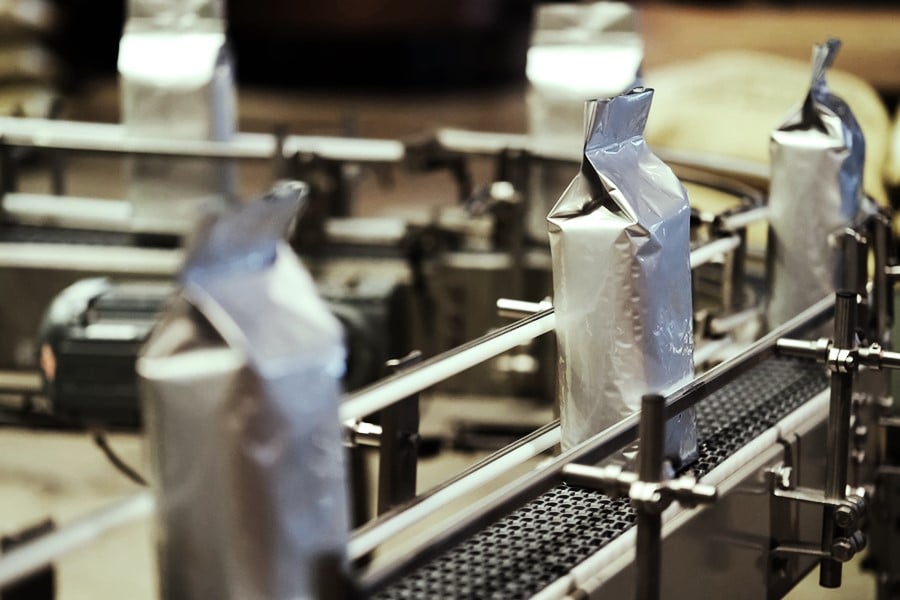Logistics
Warehousing & Fulfillment
Transportation
Industries
Technology & Innovations
E-commerce
E-commerce Fulfillment Services
Lease & Maintenance
Semi Trucks
Logistics
E-commerce
Lease & Maintenance
Buy Used Trucks

Key takeaways
Although the success of a brand is often dependent on the quality of its products, how you package those products and deliver them to consumers also matters.
An August 2022 study published in the Journal of Business Research concluded that visual appeal drives consumer decision-making. As businesses scale, the demand for high-quality packaging grows and becomes a greater priority.
This is where the right co-packaging partner can make all the difference. Sending out products in high-quality packaging helps you maintain your reputation while streamlining operations and reducing costs.
With the right co-packaging provider, you can focus on what you do best.
Here, we'll explore how the right contract packaging partner can elevate your brand to new heights and grow your market competitiveness.
The Role of a Co-packaging Provider
Co-packaging, or Contract packaging, refers to outsourcing packaging tasks to specialized companies that handle everything from design to assembly and logistics. These contract packaging firms are essential to the supply chain: They provide peace of mind that your products are being delivered to your customers with attractive, professional packaging.
Service providers offer various options, such as creating custom packaging designs, assembling products into final retail-ready formats, and managing the logistics of bringing products to market.
Many providers offer packaging and contract manufacturing services. Contract manufacturing, or co-man, involves outsourcing the production of goods to an external company.
These providers offer a comprehensive solution to streamlining production and packaging processes without sacrificing consistency and quality. As a result, scaling operations becomes even easier.
Turnkey vs. Tolling Solutions: Understanding the Difference
When selecting a contract packaging partner, you'll want to learn the difference between turnkey and tolling solutions.
In short, turnkey solutions involve the contract packaging provider managing the entire process, from sourcing raw materials to delivering the finished product. This approach offers several benefits, including simplified management, reduced overhead, and a single point of accountability.
Turnkey solutions make it easier for businesses to focus on their core operations while trusting the packaging partner to handle everything else.
Tolling solutions are slightly different in that they allow the client to supply the materials while the contract packaging provider handles the packaging and logistics. This model offers greater flexibility and control because businesses can leverage their existing supply chains while benefiting from the expertise of a packaging partner.
Neither solution is technically wrong or right; it depends upon your business's needs. Organizations with limited production capacity or those seeking a hassle-free experience may prefer turnkey solutions, while those with established supply chains and a desire for more control might opt for tolling solutions.
Key Considerations When Choosing a Co-Packaging Provider
Selecting the right co-packaging provider can push your company in the right direction, so you'll want to carefully consider your options.
One key factor to consider is research and development (R&D) capabilities. A provider with strong R&D expertise can create innovative, sustainable packaging solutions that align with current market trends, helping your products stand out.
Another essential aspect is display engineering expertise. Display engineering enhances product visibility and appeal on retail shelves, which is essential for brand differentiation in a crowded marketplace.
Product manufacturing integration is also a consideration. Providers that offer integrated manufacturing services provide seamless transitions from production to packaging, reducing potential bottlenecks and improving efficiency.
Additionally, you'll want to consider the provider's use of technology and automation. Advanced technologies and automation systems can boost packaging accuracy and scalability, so it's easier to meet market demands.
Finally, scalability and flexibility are critical. Your chosen provider should be able to scale operations to accommodate seasonal demand spikes or market expansion, keeping your company competitive and responsive to changing conditions.
The Benefits of Partnering With the Right Co-Packaging Provider
Partnering with the right co-packaging provider can be highly beneficial. For instance, your provider can streamline production processes by managing packaging tasks, reducing lead times, and minimizing errors so your products reach the market faster.
A couple of the most significant advantages of partnering with the right provider are cost reduction and efficiency gains. Outsourcing packaging means businesses can avoid the expense of maintaining in-house packaging infrastructure and labor, leading to substantial savings.
This partnership also allows companies to focus on core business activities. With packaging in expert hands, businesses can focus on what they do best: developing and marketing their products to the right customers.
High-quality packaging from a skilled provider can also enhance brand image and market presence. Well-packaged products attract customers and reinforce your brand's reputation.
An experienced partner can also assist with risk mitigation and compliance by following industry regulations and addressing potential issues in packaging and distribution. This expertise protects your brand moving forward.
Future Trends in Co-Packaging
The co-packaging industry is evolving to meet new market demands and consumer expectations. One such expectation is eco-friendly packaging.
As consumers become more aware of their environmental impact, the demand for sustainable packaging is growing. Co-packaging providers are adopting recyclable, biodegradable, and reusable materials, helping brands reduce their carbon footprint.
Another emerging trend is customization and personalization. Consumers today want unique and tailored products, and packaging matters as brands meet these demands. Co-packaging providers now offer personalized and customizable packaging options so brands can personally connect with their target audiences.
Technology integration and innovation are also disrupting the industry. Artificial intelligence (AI) is helping develop smarter packaging processes, permitting real-time monitoring and faster turnaround times.
Finding Your Co-Packaging Partner
Choosing the right co-packaging partner is a strategic decision that can elevate your brand. Consider looking at factors like research and development capabilities, engineering expertise, and product manufacturing integration as you make your decision.
However, everything depends on the features your company needs as it grows.
Take a minute to assess your current packaging strategies and explore the potential partnerships with contract packaging providers that align with your business goals.